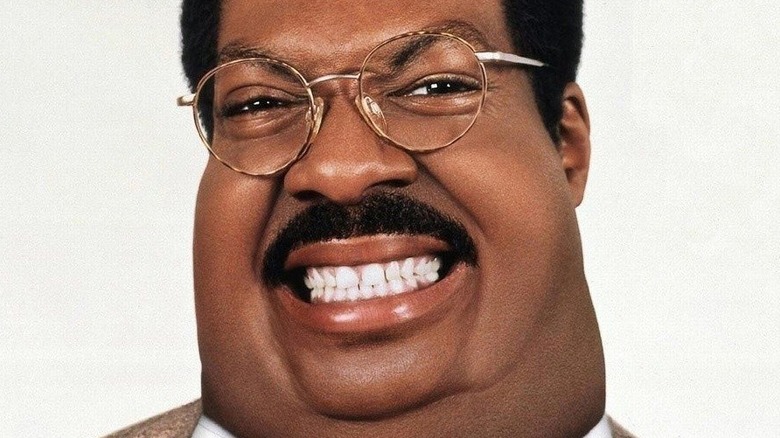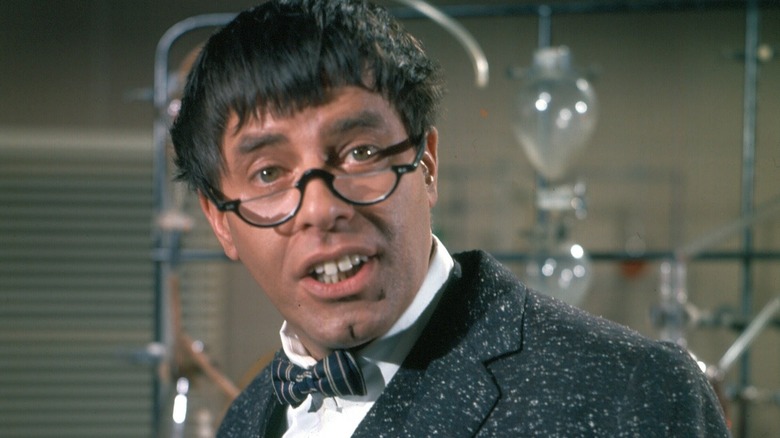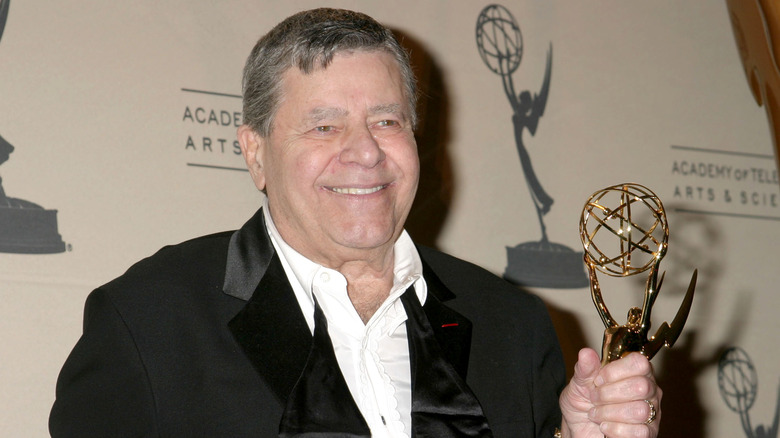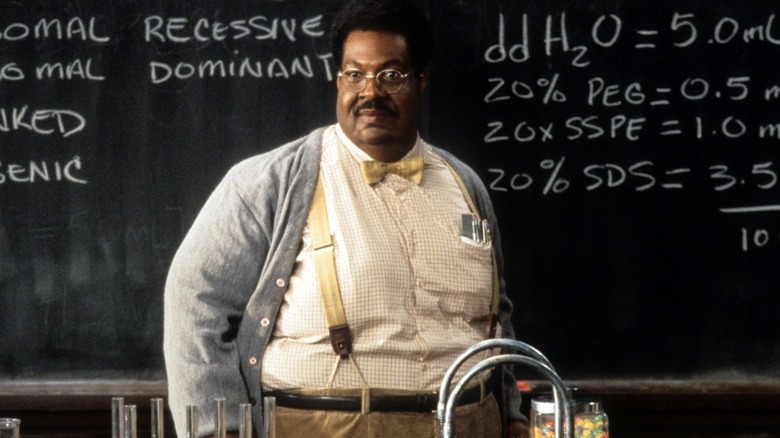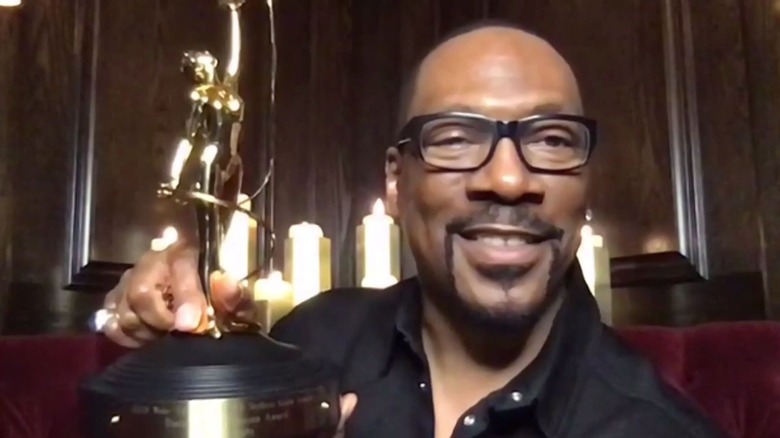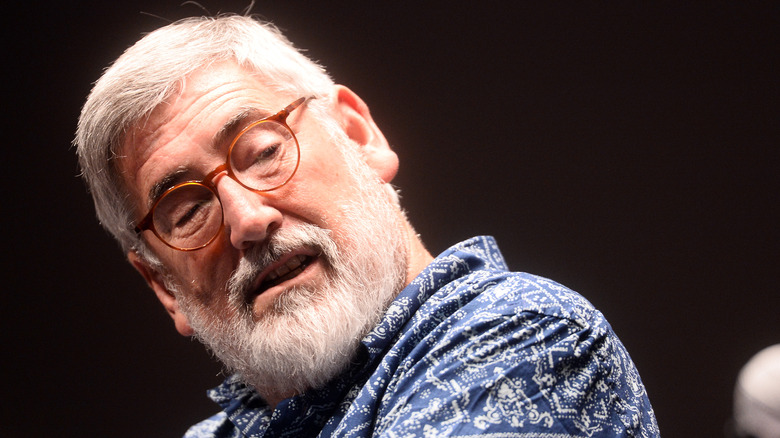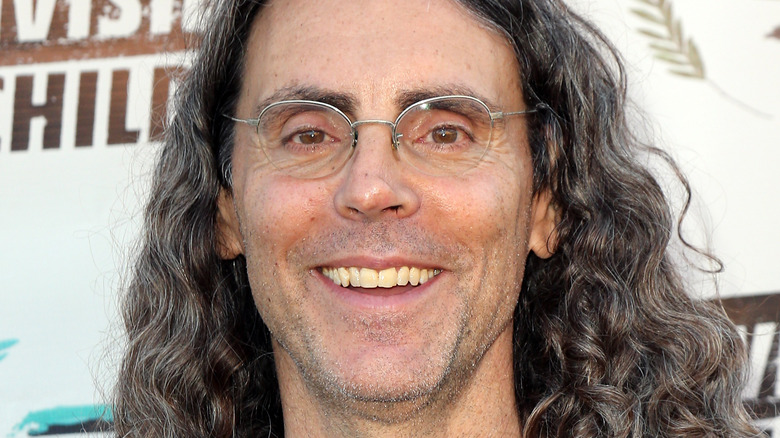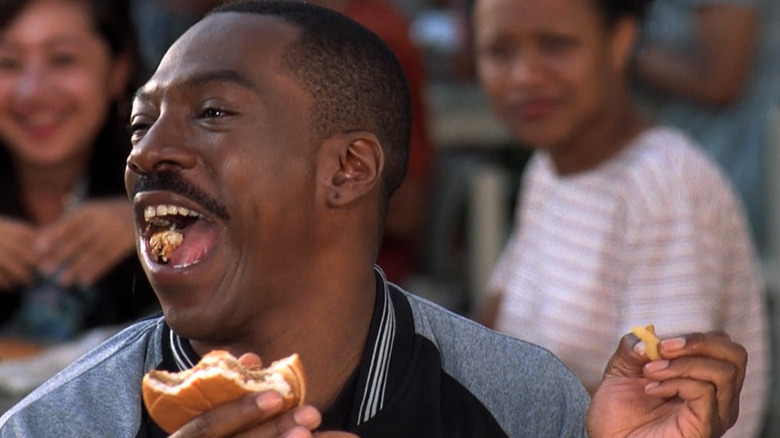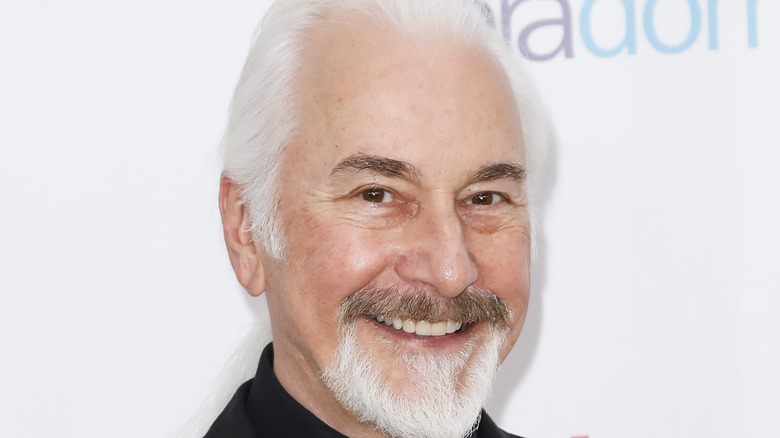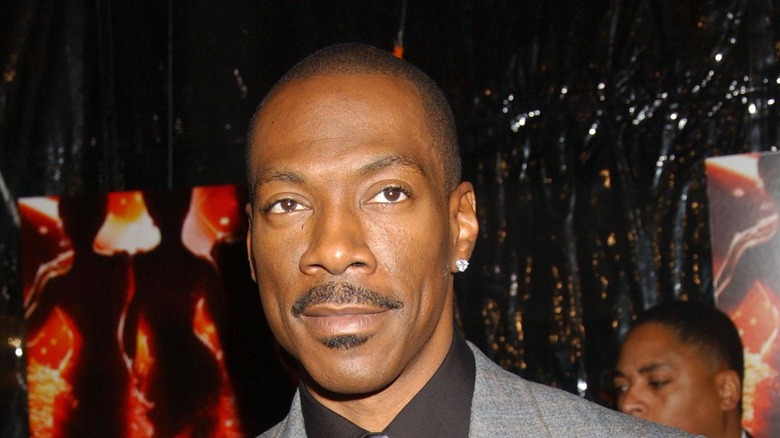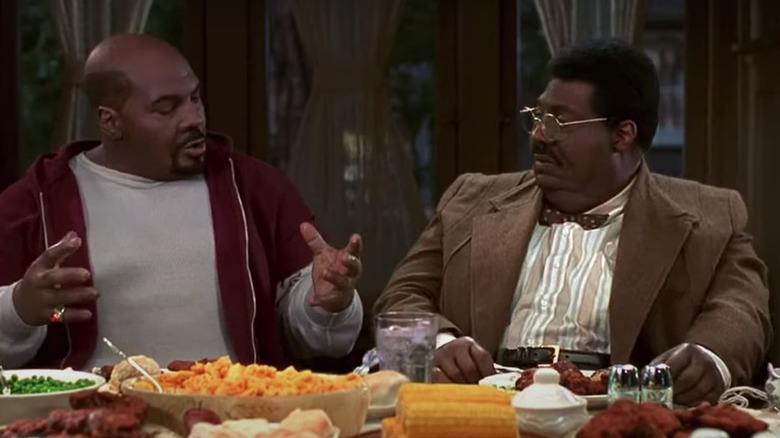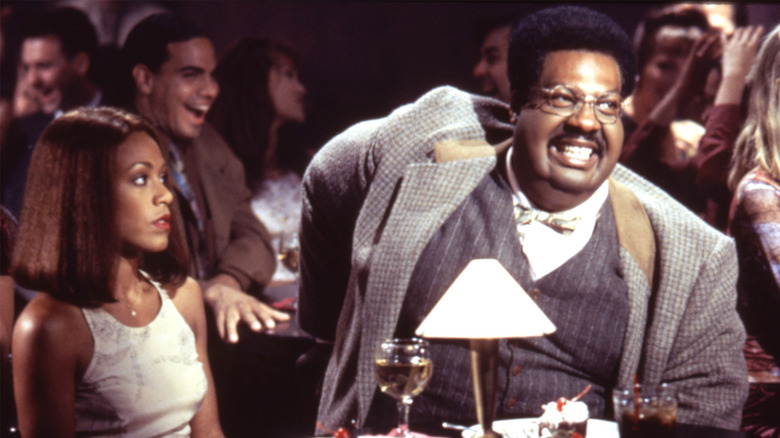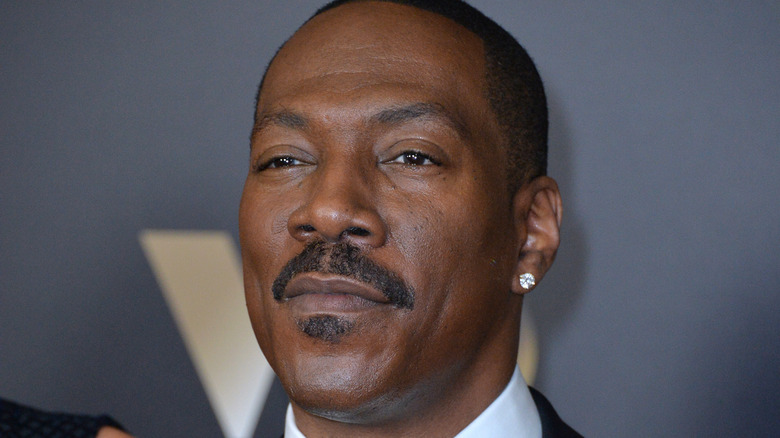The Untold Truth Of The Nutty Professor
In 1963, legendary comedian Jerry Lewis wrote and directed what many consider to be his masterpiece, "The Nutty Professor," a spin on the story of Dr. Jekyll and Mr. Hyde. In the film, Lewis plays Professor Julius Kelp, a good-hearted nerd who teaches chemistry. Kelp comes up with a formula that turns him into Buddy Love, a handsome and smooth ladies man who's also a first class jerk. In the end, Kelp learns to live with his true self, leaving Buddy Love behind, and he wins the love of Stella Purdy, a sexy, sultry blond.
In 1996, Eddie Murphy remade "The Nutty Professor," and it turned into both his career resurrection and reinvention. This time, Sherman Klump is a teacher who's on the heavier side, and Buddy Love is a skinny, good-looking, insufferable schmuck. In the end, Klump gets the girl, and in both movies, they like their nutty professors just the way they are. Both films were smash hits, and they both carried the same simple, wonderful message: It's okay to be you.
"The Nutty Professor" franchise has a long history, from Lewis' original '60s classic to today, with yet another remake being planned. There's a lot you may not know about "The Nutty Professor," and here's the untold truth behind one of the greatest comedy franchises in history.
The original Nutty Professor was geared towards adults
Jerry Lewis movies were popular with kids, and he always strove to make entertainment the entire family could enjoy. While "The Nutty Professor" was of course popular with young tykes, it was surprisingly geared more towards an adult audience.
Paramount was concerned about "The Nutty Professor" because it was more of an adult film, or as adult as Jerry Lewis could get. As it turned out, it was a big crowd-pleasing hit for people of all ages, it was Lewis' personal favorite (via USA Today) of all his films, and it earned him some of the best reviews of his career (per Rotten Tomatoes). It would also be Lewis' peak as a filmmaker, the ultimate culmination of his skills as a funny man and writer-director.
In 2004, "The Nutty Professor" was entered into the Library of Congress as an important comedy that will be preserved for generations to come. As Murphy put it (via The Seattle Times), "What's so brilliant about what Jerry Lewis did with the original 'Nutty Professor' is he saw the comic possibilities of Jekyll and Hyde. And when he turned that into a love story and had his alter-ego pursuing a woman, that gave it elements of 'Cyrano.' At the bottom of this movie are these classic stories that always work."
Jerry Lewis was initially on board for the Nutty Professor remake
Jerry Lewis was one of the most influential comedians of the 20th century, and the funny men he inspired, like Murphy, had great respect for him. Murphy presented Lewis his honorary Academy Award ("From one nutty professor to another...") and told the Los Angeles Times that his remake would be "an homage to Jerry and how brilliant he was."
When Murphy wanted to remake "The Nutty Professor," he had to go to Lewis directly, because he owned the rights. (In Lewis's deal with Paramount, the rights reverted back to him after 10 years.) The film was going to feature a Lewis cameo before he decided to back out. The reason? Too many fart jokes. "When he had to do fart jokes, he lost me," Lewis confirmed to EW.com.
Even though the "Nutty Professor" remake turned out well, with decent reviews and strong box office, Lewis eventually regretted letting the picture move forward. "I have such respect for Eddie," Lewis continued to EW. "But I should not have done it. What I did was perfect the first time around, and all you're going to do is diminish that perfection by letting someone else do it."
The Nutty Professor remake saved Eddie Murphy's career
Like many comedians, Eddie Murphy used "Saturday Night Live" as the launching pad for his success. After the box office success of "48 Hours," his career took off like a rocket, and he had three major big screen hits with "Trading Places," "Beverly Hills Cop," and "Coming to America." (His ultra-raunchy comedy special "Delirious" was also a big success on home video.)
After "America," his career took a nose dive with bombs like "Harlem Nights" (which he also directed), "Boomerang," and the painfully unfunny "Beverly Hills Cop III." Murphy desperately needed a hit, and "The Nutty Professor" felt like it was make or break.
Thankfully, Eddie Murphy pulled it off, and "The Nutty Professor": was indeed a big success, making $273 million worldwide (via Box Office Mojo). It also got mostly positive notices from critics, who were delighted that Murphy was finally funny again.
As Roger Ebert wrote, "Eddie Murphy's talent for comedy has been in eclipse during these lean recent years ... But in 'The Nutty Professor' he's back with exuberance and energy, in a movie that's like a thumb to the nose for everyone who said he'd lost it."
With The Nutty Professor, Murphy reinvented himself
Not only was "The Nutty Professor" a big hit when Eddie Murphy needed it, it was also the beginning of a new phase of his career where he was doing more family-friendly entertainment.
Back in the '80s, Murphy was known for his outrageous, down-and-dirty brand of comedy. In order to reinvent himself, he had to play a more vulnerable role, and leave his usual slick, wisecracking, foul-mouthed persona behind him. Brian Grazer, who produced "The Nutty Professor," told the L.A. Times, "The only way to do that is have him play a character that is vulnerable ... it strips away Eddie's coolness for a while and is a role that allows him not to be in control or powerful in the beginning."
After "The Nutty Professor," Murphy had some of the biggest hits of his career with more family-friendly films like the comedy remake of "Doctor Dolittle," "Daddy Daycare," and of course, voicing Donkey in the animation blockbuster "Shrek." He was also nominated for an Oscar for his performance in "Dreamgirls," proving he had even greater range and depth than many people realized.
The Nutty Professor remake was almost directed by John Landis
In 1978, John Landis established himself as an A-list director when he helmed "National Lampoon's Animal House," which was (via The Toronto Star) the biggest comedy hit of its time. He directed Eddie Murphy in the smash hit "Trading Places," and they both hit a comedy peak with "Coming to America."
But Landis and Murphy had a fractious relationship on "America," and Landis telling Collider, "The guy on 'Trading Places' was young and full of energy and curious and funny and fresh and great. The guy on 'Coming to America' was the pig of the world ... just an a*****e."
Eventually Landis and Murphy patched things up and worked together again on "Beverly Hills Cop III" — and they almost did "The Nutty Professor" together as well. According to a report in the Los Angeles Times, Landis was eager to come aboard. It's not clear why he didn't helm the movie, but Landis and Murphy reportedly remain cordial. "I see Eddie around occasionally," Landis told Empire. "I drive by, we wave."
Tom Shadyac came aboard and became a comedy powerhouse
While another Landis-Murphy pairing didn't come together, Tom Shadyac, who just had a big hit with "Ace Ventura: Pet Detective," came aboard instead, and it would be a big step up in his directing career. In fact, after the success of "The Nutty Professor," Shaydac became a comedy powerhouse, directing Jim Carrey again in "Liar Liar," and "Bruce Almighty."
Eventually Shadyac had a spiritual awakening after suffering a bicycling accident in 2007 that left him with some lingering brain issues (via the Los Angeles Times). As he recovered, he decided to sell his mansion and live in a trailer park in Malibu. He also gave away a substantial amount of money, telling CBS (via International Business Times), "The more I give away, the wealthier I feel."
Shadyac's spiritual journey was chronicled in the documentary "I Am," and as he said in Pepperdine University's online magazine, "The accident didn't create a wisdom moment — I simply got knocked from my head to my heart and had the courage to talk about the hypocrisy I'd woken up to in my life."
Lewis and Murphy were more like Buddy Love than they'd admit
In both versions of "The Nutty Professor," Buddy Love is an egotistical jerk. Some feel the character isn't too far from Jerry Lewis and Eddie Murphy in real life.
As Landis previously mentioned, Murphy reached a point where he really got carried away with himself. He confessed to The Seattle Times, "I've had periods when I wasn't grounded. Anytime you saw me in a leather suit with a leather glove with a ring on the outside of the glove, at that period I'm not grounded."
Jerry Lewis wasn't exactly Mr. Humble either. As critic Jonathan Rosenbaum observed, "Part of what's so disturbing about Buddy Love is that Lewis clearly knows him like the back of his hand." Film historian James Beibaur also noted (via the New York Post), "Everybody's got a Jekyll and Hyde personality — and [Buddy] was his Mr. Hyde."
An important collaboration with make-up master Rick Baker
One of Eddie Murphy's most important creative partners is legendary make-up artist Rick Baker, who provided pioneering effects for "An American Werewolf in London," "Thriller," and "Men in Black," to name a few. Baker and Murphy worked together on a number of films, and their partnership on "The Nutty Professor" was probably their most groundbreaking collaboration.
Baker did the make-up for "Coming to America," which is the first time Murphy hilariously played multiple characters. With "The Nutty Professor," Murphy took the multiple character idea even further, playing a total of seven people, including Sherman's mother and father, who make hilarious banter around the dinner table.
"The Nutty Professor" was one of Baker's most challenging make-up jobs, yet he told The New York Post, "[Eddie] was so polite and cooperative. He actually enjoys the process of becoming someone else." Becoming a different person freed Murphy up to do more as an actor. "Eddie would disappear so completely as soon as I slipped that mask over his face," Baker added. "I dealt with him more as Sherman than as Eddie, and it was like losing a friend."
Murphy wanted to empathize with people of different sizes
When "The Nutty Professor" came out, there was no such term as "fat shaming," and fat people had long been an easy target of cruel jokes. Yet from the beginning, Murphy wanted to show a more compassionate look at being heavyset.
Before the "Nutty Professor" shoot, Murphy told the Los Angeles Times, "America is obsessed with weight — you have to look a certain way. There will be fat jokes at every turn, but this movie is not a [put down] of fat people."
As producer Brian Grazer explained, when Murphy becomes Buddy Love and gives comedian Dave Chapelle a taste of his own medicine, he turns into "a wish-fulfillment character who gets even with people who are insensitive and make fun of Sherman."
With at least one plus-size performer, "The Nutty Professor" hit a nerve. Pop singer Lizzo recently told Variety that she related in an emotional way to a scene in which Professor Klump opens a drawer to reveal a secret stash of candy. "I could literally cry right now thinking about it," Lizzo admitted. "People around me were laughing, but I hide food too. I feel him. I feel sympathy and empathy for him."
Eddie Murphy realized people treated him differently under the make-up
When Murphy made "The Nutty Professor," he had a two-year-old daughter. At first, she didn't recognize her father, and screamed at the sight of him. "My other kids, Bria and Myles, just laughed," Murphy told the Mirror. After four hours of makeup a day, Murphy noticed he was treated differently by the crew as well: "People were a lot warmer towards me."
As it turns out, Murphy had body image issues himself when he made "Another 48 Hours," feeling he looked too heavy on the big screen. "I was depressed at how I looked in that film," he recalled to the Los Angeles Times. Years later, he made "The Nutty Professor" with a lot of empathy towards fat people.
"If a fat person thinks the film is insulting then they missed the point," Murphy stressed. "It wasn't about, 'Hey, look how funny fat people are' ... It's the person inside that counts."
Jada Pinkett Smith hated her wig on the film
Jada Pinkett Smith played Sherman Klump's love interest, Carla Purty, in "The Nutty Professor," and it was a big step up for her career — except that she hated the wig she was forced to wear. As she recalled on "Red Table Talk," "They put me in some crazy wigs for sure, where people didn't really know enough about Black hair to know how to make wigs and what wigs should look like."
Smith called the wig she had to wear a "rough one," adding that the woman who created it did not have a good grasp of how Black women wore and styled their own hair. After that, Pinkett Smith had her own hairdresser on every subsequent film, a list that includes hits such as "Scream 2," "Ali," "Collateral," "Magic Mike XXL," and three of the four movies in the "Matrix" franchise.
The Nutty Professor is slated for another remake
While the second "Nutty Professor" film, "Nutty Professor II: The Klumps," wasn't the box office powerhouse that the first one starring Eddie Murphy was, it still did well, and it's not surprising that there's been another remake in the works. But the real surprise is who's planning the new version.
James Vanderbilt, who wrote the David Fincher true crime classic "Zodiac," as well as "Scream 5," managed to secure the rights for a "Nutty Professor" remake. It's strange to think that the screenwriter behind such scary and grim entertainment could be spearheading the next "Nutty Professor" films, and it definitely feels like an odd fit, but maybe Vanderbilt can come up with a whole new imaginative spin on the story for today's audiences.
Ultimately, the "Nutty Professor" movies have a terrific legacy. The original will always be considered Jerry Lewis' best-known work, and Eddie Murphy was able to create a surprisingly empathetic update that made audiences howl with laughter, and rethink how they treated people of different sizes. If there are more "Nutty Professor" movies in the future, here's hoping they can deliver the same good message of self-love and individuality that worked so well before.
